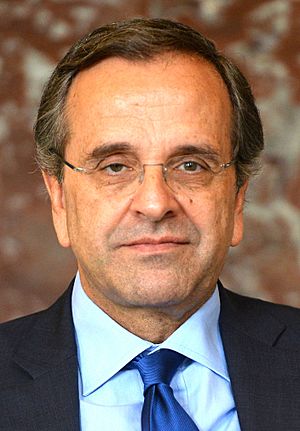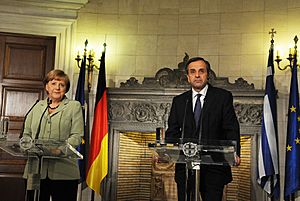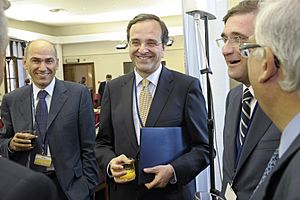Antonis Samaras facts for kids
Quick facts for kids
Antonis Samaras
|
|||||||||||||||||||||||||||||||||||||||||||||||||||||||||||||||||||||||
|---|---|---|---|---|---|---|---|---|---|---|---|---|---|---|---|---|---|---|---|---|---|---|---|---|---|---|---|---|---|---|---|---|---|---|---|---|---|---|---|---|---|---|---|---|---|---|---|---|---|---|---|---|---|---|---|---|---|---|---|---|---|---|---|---|---|---|---|---|---|---|---|
| Αντώνης Σαμαράς | |||||||||||||||||||||||||||||||||||||||||||||||||||||||||||||||||||||||

Samaras in 2014
|
|||||||||||||||||||||||||||||||||||||||||||||||||||||||||||||||||||||||
| Prime Minister of Greece | |||||||||||||||||||||||||||||||||||||||||||||||||||||||||||||||||||||||
| In office 20 June 2012 – 26 January 2015 |
|||||||||||||||||||||||||||||||||||||||||||||||||||||||||||||||||||||||
| President | Karolos Papoulias | ||||||||||||||||||||||||||||||||||||||||||||||||||||||||||||||||||||||
| Deputy | Evangelos Venizelos | ||||||||||||||||||||||||||||||||||||||||||||||||||||||||||||||||||||||
| Preceded by | Panagiotis Pikrammenos (caretaker) | ||||||||||||||||||||||||||||||||||||||||||||||||||||||||||||||||||||||
| Succeeded by | Alexis Tsipras | ||||||||||||||||||||||||||||||||||||||||||||||||||||||||||||||||||||||
| Leader of the Opposition | |||||||||||||||||||||||||||||||||||||||||||||||||||||||||||||||||||||||
| In office 26 January 2015 – 5 July 2015 |
|||||||||||||||||||||||||||||||||||||||||||||||||||||||||||||||||||||||
| Prime Minister | Alexis Tsipras | ||||||||||||||||||||||||||||||||||||||||||||||||||||||||||||||||||||||
| Preceded by | Alexis Tsipras | ||||||||||||||||||||||||||||||||||||||||||||||||||||||||||||||||||||||
| Succeeded by | Vangelis Meimarakis | ||||||||||||||||||||||||||||||||||||||||||||||||||||||||||||||||||||||
| In office 30 November 2009 – 20 June 2012 |
|||||||||||||||||||||||||||||||||||||||||||||||||||||||||||||||||||||||
| Prime Minister | George Papandreou Lucas Papademos Panagiotis Pikrammenos (caretaker) |
||||||||||||||||||||||||||||||||||||||||||||||||||||||||||||||||||||||
| Preceded by | Kostas Karamanlis | ||||||||||||||||||||||||||||||||||||||||||||||||||||||||||||||||||||||
| Succeeded by | Alexis Tsipras | ||||||||||||||||||||||||||||||||||||||||||||||||||||||||||||||||||||||
|
|||||||||||||||||||||||||||||||||||||||||||||||||||||||||||||||||||||||
| Personal details | |||||||||||||||||||||||||||||||||||||||||||||||||||||||||||||||||||||||
| Born | 23 May 1951 Athens, Greece |
||||||||||||||||||||||||||||||||||||||||||||||||||||||||||||||||||||||
| Political party | New Democracy (1977–1992, 2004–2024) Political Spring (1993–2004) Independent (2024-present) |
||||||||||||||||||||||||||||||||||||||||||||||||||||||||||||||||||||||
| Spouse |
Georgia Kretikos
(m. 1990) |
||||||||||||||||||||||||||||||||||||||||||||||||||||||||||||||||||||||
| Children | 2 | ||||||||||||||||||||||||||||||||||||||||||||||||||||||||||||||||||||||
| Relatives | Emmanouil Benakis (great-great-grandfather) Penelope Delta (great-grandmother) |
||||||||||||||||||||||||||||||||||||||||||||||||||||||||||||||||||||||
| Education | Amherst College (BA) Harvard University (MBA) |
||||||||||||||||||||||||||||||||||||||||||||||||||||||||||||||||||||||
Antonis Samaras (Greek: Αντώνης Σαμαράς, pronounced [anˈdonis samaˈɾas]; born 23 May 1951) is a Greek politician. He served as Prime Minister of Greece from 2012 to 2015. He was also the leader of the New Democracy political party from 2009 until 2015.
Samaras began his national political career as Minister of Finance in 1989. He later served as Minister of Foreign Affairs from 1989 to 1992. In 2009, he became Minister of Culture.
He was known for a political disagreement in 1993. This event led to a change in the government at the time. Despite this, he rejoined the New Democracy party in 2004. He was then elected as its leader in a close election in late 2009. He was the seventh person to lead the party since it started in 1974.
Samaras remained a Member of Parliament for the Messenia region. In November 2024, he was no longer part of the New Democracy party. This happened because he openly disagreed with the foreign policy of the government led by Kyriakos Mitsotakis.
Contents
Early Life and Education
Antonis Samaras was born in Athens, Greece. His father, Dr. Konstantinos Samaras, was a professor of heart medicine. His mother, Lena, was the granddaughter of the famous author Penelope Delta. His brother, Alexander, is an architect. His uncle, George Samaras, was also a Member of Parliament for many years.
Samaras grew up in Athens among well-known families. When he was 17, he won the Greek Teen Tennis Championship. He went to school at Athens College, which was co-founded by his great-great-grandfather, Emmanouil Benakis. He then studied economics at Amherst College, graduating in 1974. In 1976, he earned a business degree from Harvard University.
Interestingly, Samaras and former Prime Minister George Papandreou were roommates in college. However, they later became political opponents. Samaras is married and has two children, a daughter and a son.
Political Career
First Steps in Politics
Samaras was first elected as a Member of Parliament for Messinia in 1977. In 1989, he became the Minister of Finance. He then served as the Minister of Foreign Affairs from 1990 to 1992. During this time, he had different ideas about how to solve a disagreement over the name of a neighboring country. Because of these differences, he was later removed from his role as Foreign Minister.
Starting a New Party
After leaving his government position, Samaras started his own political party called Political Spring. This party was also on the right side of politics, similar to New Democracy. In 1993, one Member of Parliament left New Democracy to join Samaras's new party. This event led to the government losing its majority and new elections being called.
In the 1993 general election, Political Spring received 4.9% of the votes. This was enough to win ten seats in the Hellenic Parliament. The party also did well in the 1994 European Parliament election, getting 8.7% of the votes and two seats. However, the party's support began to decrease after that.
Returning to New Democracy
Political Spring did not take part in the 2000 general election. Instead, Samaras publicly supported the New Democracy party. Before the 2004 general election, Samaras decided to close down his party and rejoin New Democracy. He was then elected as a Member of the European Parliament (MEP) in the 2004 European elections.
In the 2007 general election, he was elected to the Hellenic Parliament for Messinia. He then left his position in the European Parliament. In January 2009, he became the Minister of Culture. In this role, he opened the new Acropolis Museum in July 2009. He was re-elected as an MP for Messenia in 2009.
After New Democracy lost the 2009 legislative election, its leader, Kostas Karamanlis, resigned. This led to a new election for the party's leader. Samaras decided to run for the position. Early polls showed he was very close to Dora Bakoyanni, who was also a strong candidate. Another candidate, Dimitris Avramopoulos, later decided to support Samaras. For the first time, the new leader was chosen by party members across the country. Samaras's popularity grew, and he became the favorite to win.
Leading the Opposition
On 30 November 2009, Antonis Samaras was elected the new President of New Democracy. His main opponent, Dora Bakoyanni, accepted her defeat and congratulated him. Samaras gave a speech at the party headquarters, promising to make big changes to the party. He wanted to help the party become the leading political force again. Later, he played a key role in removing Bakoyanni from the party in 2010. This happened because she voted for a tough economic measure that the party had decided against.
In October 2011, Prime Minister George Papandreou announced plans for a public vote on a European Union financial support deal. However, after strong opposition, he canceled the plan a few days later.
On 5 November, Papandreou's government barely won a vote of confidence in Parliament. He then called for early elections. The next day, Papandreou met with leaders from other parties to try and form a temporary government of national unity. Samaras agreed to this only after Papandreou stepped down. This allowed the financial support deal to move forward and set the stage for elections in February 2012.
After many days of talks, the two main parties and another party agreed to form a large coalition government. This government was led by Lucas Papademos, who used to be a Vice President of the European Central Bank. On 10 November, George Papandreou officially resigned as Prime Minister. The new government and Prime Minister Papademos were sworn in on 11 November 2011.
Prime Minister of Greece



After the May 2012 general election, New Democracy became the largest party in the Hellenic Parliament. President Karolos Papoulias asked Samaras to try and form a government. However, after a day of talks, Samaras announced he could not form a government. The task then went to Alexis Tsipras, the leader of Syriza, the second largest party, but he also could not form a government. After the Panhellenic Socialist Movement (PASOK) also failed, new elections were called. Panagiotis Pikrammenos, a judge, was appointed as a temporary Prime Minister to lead a caretaker government.
Voters went to the polls again in the June 2012 election. The New Democracy party did even better, winning 129 seats. On 20 June 2012, Samaras successfully formed a coalition government. This government included PASOK, led by Evangelos Venizelos, and the Democratic Left (DIMAR). The new government had a strong majority in Parliament.
The Democratic Left left the coalition on 21 June 2013. This happened because they disagreed with the government's decision to close the public broadcaster, Hellenic Broadcasting Corporation (ERT). This left Samaras with a smaller majority in Parliament. The two remaining parties, New Democracy and PASOK, then reorganized the government, giving PASOK a bigger role.
As Prime Minister, Samaras introduced many changes and tough economic measures. His goal was to reduce the government's debt and make the Greek economy stronger. In 2013, he passed laws to reduce the number of public employees. At the same time, he lowered the sales tax on restaurants. He also introduced a new property tax.
Greece achieved a budget surplus in 2013, meaning the government collected more money than it spent. In April 2014, Greece was able to borrow money from international investors again. Greece's credit rating also improved. The country's economy started growing again in the second quarter of 2014, after six years of decline. Tourism also increased significantly, with over 22 million tourists visiting Greece in 2014. In healthcare, the Minister for Health provided free medicine to over 2 million citizens who did not have health insurance.
On 9 December 2014, Samaras announced that Stavros Dimas would be a candidate for President of Greece. However, Dimas did not get enough votes from Members of Parliament. Because of this, new elections were held on 25 January 2015. These elections were won by the Syriza party. Alexis Tsipras became the new Prime Minister. Samaras resigned as leader of New Democracy on 5 July 2015, after a public vote on a financial support deal. He had supported the "Yes" vote, but the "No" vote won by a large margin. Vangelis Meimarakis became the temporary leader of New Democracy.
After Being Prime Minister
In November 2024, Samaras was no longer part of the New Democracy party. This happened after he criticized the foreign minister and the government's handling of certain issues in a newspaper interview. In response, Samaras said that no one could force him to go against his beliefs. He also stated that the people and history would be the ultimate judges.
Images for kids
See also
 In Spanish: Andonis Samarás para niños
In Spanish: Andonis Samarás para niños
 | Georgia Louise Harris Brown |
 | Julian Abele |
 | Norma Merrick Sklarek |
 | William Sidney Pittman |







